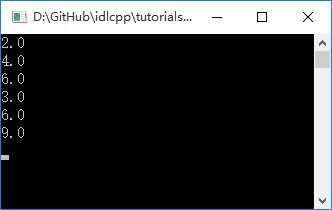C++混合编程之idlcpp教程Python篇
Posted
tags:
篇首语:本文由小常识网(cha138.com)小编为大家整理,主要介绍了C++混合编程之idlcpp教程Python篇相关的知识,希望对你有一定的参考价值。
上一篇在这 C++混合编程之idlcpp教程Python篇(8)
第一篇在这 C++混合编程之idlcpp教程(一)
与前面的工程相比,工程PythonTutorial7中除了四个文件PythonTutorial7.cpp, Tutorial7.cpp, Tutorial7.i, tutorial7.py 外,Tutorial6.cpp也被加入了此工程中。其中PythonTutorial7.cpp的内容基本和PythonTutorial6.cpp雷同,不再赘述。首先看一下Tutorial7.i的内容:
#import "Tutorial6.i" namespace tutorial { struct Ray3<T> { Ray3(); Ray3(const Vector3<T>& origin, const Vector3<T>& direction); void getPoint(Vector3<T>& point, T t) const; Vector3<T> getPoint(T t) const; Vector3<T> m_origin; Vector3<T> m_direction; }; export Ray3<float>; export Ray3<double>; typedef Ray3<float> Ray3f; typedef Ray3<double> Ray3d; #{ template<typename T> inline Ray3<T>::Ray3() {} template<typename T> inline Ray3<T>::Ray3(const Vector3<T>& origin, const Vector3<T>& direction) : m_origin(origin), m_direction(direction) {} template<typename T> inline void Ray3<T>::getPoint(Vector3<T>& point, T t) const { point.x = m_origin.x + m_direction.x * t; point.y = m_origin.y + m_direction.y * t; point.z = m_origin.z + m_direction.z * t; } template<typename T> inline Vector3<T> Ray3<T>::getPoint(T t) const { return Vector3<T>(m_origin.x + m_direction.x * t, m_origin.y + m_direction.y * t, m_origin.z + m_direction.z * t); } #} }
第一行
#import "Tutorial6.i"
在后面Ray3的定义中使用到了模板类Vector3,所以在此处要先引入此文件。
struct Ray3<T>
此处定义了模板类Ray3。其中有类型为Vector3<T>的两个成员变量m_origin和m_direction。在这个类中以 m_origin + m_direction * t (t >= 0) 参数方程的形式表示一个射线。有两个名为getPoint的重载函数用来获取射线上的一点坐标。
export Ray3<float>;
export Ray3<double>;
模板实例化,这两行代码指示idlcpp生成相应类型的元数据信息。
typedef Ray3<float> Ray3f;
typedef Ray3<double> Ray3d;
定义类型别名,方便使用。
编译后生成的Tutorial7.h的内容如下:
//DO NOT EDIT THIS FILE, it is generated by idlcpp //http://www.idlcpp.org #pragma once #include "./Tutorial6.h" namespace tutorial { template<typename T> struct Ray3 { public: Ray3(); Ray3(const Vector3<T>& origin,const Vector3<T>& direction); void getPoint(Vector3<T>& point,T t)const ; Vector3<T> getPoint(T t)const ; Vector3<T> m_origin; Vector3<T> m_direction; }; typedef Ray3<float> Ray3f; typedef Ray3<double> Ray3d; template<typename T> inline Ray3<T>::Ray3() {} template<typename T> inline Ray3<T>::Ray3(const Vector3<T>& origin, const Vector3<T>& direction) : m_origin(origin), m_direction(direction) {} template<typename T> inline void Ray3<T>::getPoint(Vector3<T>& point, T t) const { point.x = m_origin.x + m_direction.x * t; point.y = m_origin.y + m_direction.y * t; point.z = m_origin.z + m_direction.z * t; } template<typename T> inline Vector3<T> Ray3<T>::getPoint(T t) const { return Vector3<T>(m_origin.x + m_direction.x * t, m_origin.y + m_direction.y * t, m_origin.z + m_direction.z * t); } }
然后是Tutorial7.cpp
#include "Tutorial7.h" #include "Tutorial7.mh" #include "Tutorial7.ic" #include "Tutorial7.mc"
因为模板类的代码都写在头文件中了,所以Tutorial7.cpp只需要包含对应的四个文件即可。
另外模板类Ray3用到了模板类Vector3,所以其实例化类型Ray3<float>和Ray3<double>也分别用到Vector3的实例化类型Vector3<float>和Vector3<double>,相应的Ray3<float>元数据中也会用到Vector3<float>的元数据信息。所以在这个工程中需要将Tutorial6.cpp加入进来。
最后看一下Tutorial7.py的内容
p = paf.float.NewArray(3); p[0] = 1; p[1] = 2; p[2] = 3; ray = paf.tutorial.Ray3f(paf.tutorial.Vector3f.s_zero, paf.tutorial.Vector3f(p)); pt = paf.tutorial.Vector3f(0,0,0); ray.getPoint(pt, 2); print(pt.x._); print(pt.y._); print(pt.z._); pt = ray.getPoint(3); print(pt.x._); print(pt.y._); print(pt.z._);
第一行:
p = paf.float.NewArray(3);
创建一个float类型的数组,共三个元素,其中float是内置的类型。C++的原生类型在idlcpp中都是支持的,如下:
bool char signed char unsigned char wchar_t short unsigned short long unsigned long long long unsigned long long int unsigned int float double long double
考虑到有些类型中间有空格,为脚本使用方便,还为这些类型定义了别名,具体参见pafcore中的Typedef.i
编译执行,结果如下图:

以上是关于C++混合编程之idlcpp教程Python篇的主要内容,如果未能解决你的问题,请参考以下文章